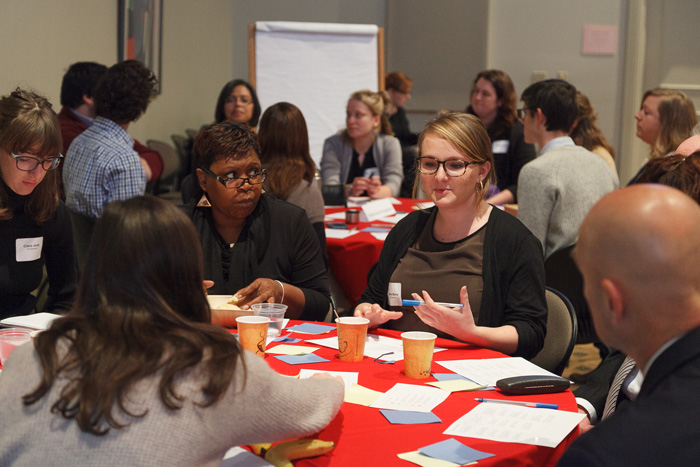Moving Parts

Photo by Carl Socolow '77.
College and community members meet to discuss Carlisle’s resilience
by Tony Moore
People tend to go to community meetings when they’re upset about something, when they need to air some bubbling personal grievance and point fingers. But in the Stern Center Great Room Tuesday morning, 50 or so people came together to parse a multipronged issue important to all of them: the long-term resilience of the Carlisle community.
“We wanted to start the conversation in Carlisle: Are we resilient? In what ways? In what ways do we fall short? And is there some consensus on trying to do things to deliberately build resilience?” says Neil Leary, director of Dickinson’s Center for Sustainability Education (CSE), who explains, in brief, that resilience is a trait that enables individuals and communities to meet their needs and thrive in the face of change.
The issues
The workshop was the culmination of a semesterlong course and project that immersed students in an environment of experiential and service learning.
"Our students engaged with the Carlisle community in ways that build their knowledge and skills while also benefitting the community by providing information and convening a conversation in response to a community need," Leary says, noting that the undertaking was carried out at the request of and in collaboration with the Carlisle borough and the Greater Carlisle Project. "The students worked the entire semester getting out into the community, interviewing over 30 leaders of community organizations, businesses and public agencies and researching attributes of resilience in Carlisle."
At the event, attendees—representatives of the Salvation Army, Project SHARE, Safe Harbor, and Carlisle CARES, among them—were separated into four groups representing vital aspects of any community’s makeup: health and wellness, infrastructure and ecosystems, leadership and strategy and economy and society. The groups then discussed issues ranging from mental health, substance abuse, local nonprofit services, transportation, housing and economic stability, all viewed through the Carlisle lens.
“Our neighborhood has a large population of lower-income residents, and when issues arise, these folks are affected the most because they don’t have the financial safety net that other residents can rely on,” says Brenda Landis, who’s a multimedia specialist in Dickinson’s Media Center when she’s not advocating on behalf of Carlisle West Side Neighbors and Carlisle at large. “I’m always trying to look through the eyes of the people in my neighborhood and to advocate for the things that would be most important to them.”
“Carlisle, and any other town, can always be making itself better, by responding to new information it gathers,” says Olivia Termini ’19 (environmental studies), a student in Leary’s class Building Sustainable Communities, which served as a jumping-off point for the event. “Carlisle has many of the mechanisms in place to build resilience, but it needs to work on the human interactions and services side of resilience so that these mechanisms can be used to their full potential.”
Toward improvement
As Termini points out, Carlisle has a lot going for it: As the county seat—and a municipality that’s home to the U.S. Army War College, Dickinson and a growing patchwork of warehouses just outside of town—Carlisle is a stable place to live, economically. But those warehouse jobs, on the other hand, are often low-paying and are just far enough away from the town center to make them tough to get to if an employee doesn’t have a car.
“I think Carlisle is a fairly resilient place,” Leary says, “but it's time to be deliberate in examining what sort of things build resilience in our community, focus on those and see if we can improve.”
Toward that end, Dickinson, the Greater Carlisle Project and the borough of Carlisle are together using the City Resilience Index (CRI), a tool developed by Arup International with support from the Rockefeller Foundation, to measure and work toward improving community resiliency. In the spring, as part of an independent research project, Termini will be working with community stakeholders to validate the CRI output and organize meetings, workshops and group discussions to parse the information. Outcomes of the workshop will be used to inform conversations going forward about incorporating resilience thinking and planning in an update of Carlisle’s comprehensive plan.
Leary says student research will continue in the spring to add to understanding of community resilience in Carlisle, which will help the borough identify strategies for building resilience. "The research is producing real and important benefits for the community," he adds.
“Community has always been important to me,” says Termini, a member of Alpha Phi Omega, the service fraternity, and a Montgomery Service Leader. “The project is a wonderful way to break outside of the limestone walls and give back to the area I live in, build relationships with community members and learn while doing it.”
Read more about Carlisle and the CRI in "Reacting to Change."
Learn more
- Center for Sustainability Education
- Civic Engagement at Dickinson
- Student Service in the Community
- Department of Environmental Studies & Environmental Science
- Latest News
Published December 7, 2016